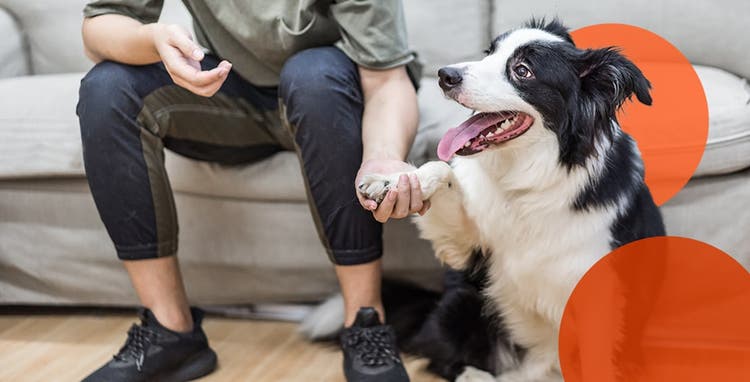Plus what to ask before you do.
When most people think of dog adoption, they often imagine puppies wagging their tails on their way to their new forever homes. But let’s be honest: Puppies, while adorable, can come with challenges. Your new best friend doesn’t always have to come with house training and puppy biting. In fact, there are plenty of amazing perks to adopting an older dog — here we discuss 10 of them.
Why Adopt a Senior Dog?
Adopting a senior dog can provide you with all the joys of dog ownership minus the trials of puppyhood. It can be easy to assume that someone is giving up a dog because of bad behavior. But that’s not always the case. There are many reasons adult dogs are available for adoption, including changes to an owner’s lifestyle, lack of time, family emergency or a move. Adoptable older dogs can be a great fit and come with lots of perks. Here are some of benefits of adopting senior pets:
- Often little to no house training: While most puppies are house trained in four to six months, it can take some puppies up to a year to no longer have accidents in the house.1 A senior dog is most likely to have been house trained for quite some time, so they have more control over their bladder than small puppies. If they could use a refresher course, it’s often quite easy to house train adult dogs.
- No (or less) chewing: Puppies typically stop chewing by the time they’re 6 months old.2 And if your dog was a chewer, the previous owners may have gone through steps to train the dog not to chew.
- You can often leave home for longer periods of time: Most older dogs can be left home alone for longer than a puppy (though they still need exercise, trips outside and time with you!).3
- There are fewer surprises: When you adopt a senior dog, you will know how much the dog is going to grow and you will have a fairly good idea of its temperament.
- Everything is a little bit more chill: An older dog can get as many as 12 to 14 hours of sleep per day. They may also rest an additional 30% of their day. This means adult dogs may only be active about 20% of the day.4
- They may already be trained (and may even know some fun tricks!): A senior dog is likely already housetrained. Depending on the rules and habits of the previous owner, a senior dog may have picked up a few other tricks too, such as coming when called, sitting, loose-leash walking and more.
- It may be less expensive: Some shelters will charge less money for older dogs. Your vet bills — at least upon adoption — might be less expensive than with a puppy, too, as rescues and shelters often spay or neuter all dogs before they can be adopted. (General vet expenses can vary, of course, based on the individual dog’s health and the previous care they received). And whereas puppies outgrow things (collars, beds, toys), a senior dog’s size will already be known and are less likely to change.
- You may still have many years of love left to give (and receive): A dog’s breed, size and health all factor into how long a dog will live. A small dog’s breed average lifespan is 10 to 15 years — some can live as long as 18 years. Medium-sized dogs live an average of 10 to 13 years. Large- and giant-sized dogs live 8 to 12 years.5 Most experts say that dogs are considered senior when they reach the last 25% of the estimated lifespan for their breed.6
- They need you: More puppies get adopted than older dogs. According to the American Society for the Prevention of Cruelty to Animals (ASPCA), senior dogs have a 25% adoption rate compared to a 60% adoption rate for younger dogs and puppies.7
- They will LOVE you for it (and you will likely love yourself for it, too): A senior dog that needs adopted likely could use a little love. Even if the dog’s previous owners were heartsick to have to give their dog up, there has been displacement and loss. Walking with you, curled up the couch next to you, and greeting you at the door may be transformative to a dog’s mood. And having someone around the house who is always happy to see may be transformative for you, too.
What Should You Consider Before Adopting a Senior Dog?
So you’ve fallen in love with an older dog. Before you fill out the paperwork, here are some questions to ask:
- How old is the dog?
- How did the dog end up at the shelter?
- What was the dog’s life like before?
- Do you have any details of the dog’s past medical history?
- Do you know when the dog had their last vet appointment?
- Is the dog up to date on vaccinations?
- Is the dog currently dealing with any health issues?
- What does the dog eat and how much?
- What is the dog’s temperament?
- How is the dog around children?
- How is the dog around other animals, such as dogs and cats?
- How well-trained is the dog? (Specific questions to ask may include: Is the dog house trained? Can the dog walk well with a leash? Does the dog know basic commands?)
When Adopting Older Dogs, How Do I Know If Their Personality Is a Good Fit?
You can tell a lot by a dog’s body language. Look for a relaxed posture, slightly open mouth, normal shape and size eyes, relaxed ears and a tail that is wagging in a slow, wide pattern. If a dog rolls over basically begging to be scratched, that’s a good sign as well. So is a dog that makes eye contact with you, seems to be playful with you (older dogs can be playful too!) and tries to snuggle with you.
That said, all dogs are different, and a shelter environment can sometimes make even the friendliest dogs shy, hesitant or uninterested in interacting. Ask the shelter whether they host meet-and-greets between potential adopters and dogs, where you can get to know the dog in a quieter setting, or even outside in a fenced-in area. Some rescues even offer at-home trial periods where you can spend several days with each other to see if you’re a good fit.
And don’t forget about other children, family members and pets in the house! As much as possible, make sure everyone in the household gets a chance to meet the new family member before you adopt.
According to ASPCA, approximately 390,000 shelter dogs are euthanized each year. And remember, senior animals are usually the last to be adopted.8 Choosing to adopt a senior dog can be a life-saving gift — and a life-changing one for you, as well.
Resources
- Edgar, J. “House Training Your Puppy” (November 7, 2022). Fetch by WebMD. https://www.webmd.com/pets/dogs/house-training-your-puppy
- “Destructive Chewing” (accessed December 2, 2022). American Society for the Prevention of Cruelty to Animals. https://www.aspca.org/pet-care/dog-care/common-dog-behavior-issues/destructive-chewing
- Driver, S. “How Long Can You Leave a Puppy Alone?” (August 4, 2021). American Kennel Club. https://www.akc.org/expert-advice/puppy-information/leave-puppy-alone/
- Kearl, M. “Too Much Sleep: Is There Such a Thing for Senior Dogs?” (September 12, 2019). American Kennel Club. https://www.akc.org/expert-advice/health/too-much-sleep-is-there-such-a-thing-for-senior-dogs/
- Burke, A. “How Long Do Dogs Live” (July 14, 2016). American Kennel Club. https://www.akc.org/expert-advice/health/how-long-do-dogs-live/
- “Caring for senior cats and dogs.” (accessed December 2, 2022). America Veterinary Medical Association. https://www.avma.org/resources-tools/pet-owners/petcare/senior-pets
- “Four Reasons to Open Your Mind to Older Pets” (November 26, 2018). American Society for the Prevention of Cruelty to Animals. https://www.aspca.org/blog/four-reasons-open-your-mind-older-pets
- “Pet Statistics.” (accessed December 2, 2022). American Society for the Prevention of Cruelty to Animals. https://www.aspca.org/helping-people-pets/shelter-intake-and-surrender/pet-statistics









